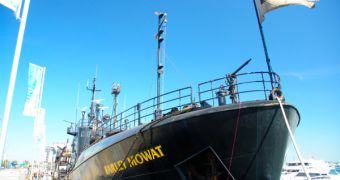The hard-line anti-whaling group Sea Shepherd announced on Wednesday that it was ready to renounce its violent actions in the freezing waters of Antarctica this season, if the governments of Australia or New Zealand filed a case against Japan for illegal whaling, and asked for the termination of the country's yearly cull. The protesters say that international courts of law are the highest instances in the world, and that a measure coming from them would virtually force the Asian nation to stop killing the endangered whales.
"Take them to court, and if that fails, if the Japanese refuse to appear, if they refuse to abide by any legal decision, Sea Shepherd could then return with a much more aggressive approach," Paul Watson, captain of Sea Shepherd's flagship, Steve Irwin, and founder of the organization, emphasizes. The group is responsible for numerous attacks on whalers over the years, from waters near Canada to those of Australia. It claims to have sunk more than 8 ships, which had been illegally conducting hunting operations on the protected species.
Officials in Canberra are currently pondering the possibility of suing Japan internationally. There is, however, a small inconvenience. The two countries are engaged in economic relations worth more than $35 billion. Environment Minister Peter Garrett is now between hammer and anvil – although he knows that the country would have a massive case to bring against Japan, seeing how last year an Australian coastal guard ship monitored the Japanese fleet throughout the season, the threat of damage to imports and exports may be larger than the government is willing to accept.
On the other hand, officials in New Zealand have told the official NZPA news agency that advisors are taking the offer into consideration, analyzing all its possible implications as we speak. A government spokesman said that the Foreign Affairs Minister, Murray McCully, would be advised on the matter, as soon as a thorough assessment was completed.
Japan can still fish without international criticism and punishment under a 1986 UN Charter, which states that commercial whaling is forbidden worldwide, but imposes no limitation on scientific studies. So, in 1987, Japan started its Institute for Cetacean Research, whose job was to cull more than 900 whales each year. Most of these whales end up on supermarket shelves and dinner plates.

 14 DAY TRIAL //
14 DAY TRIAL //